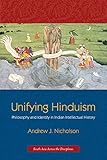Unifying Hinduism : philosophy and identity in Indian intellectual history / Andrew J. Nicholson.
Material type: TextSeries: South Asia across the disciplinesPublication details: New York : Columbia University Press, ©2010.Description: 1 online resource (xii, 266 pages)Content type:
TextSeries: South Asia across the disciplinesPublication details: New York : Columbia University Press, ©2010.Description: 1 online resource (xii, 266 pages)Content type: - 9780231526425
- 0231526423
- 1282872419
- 9781282872417
- 9786612872419
- 6612872411
- 294.509 22
- BL1150 .N53 2010eb
- online - EBSCO
- 11.92
| Item type | Current library | Call number | URL | Status | Notes | Barcode | |
|---|---|---|---|---|---|---|---|
 eBook
eBook
|
Biblioteca "Angelicum" Pont. Univ. S.Tommaso d'Aquino Nuvola online | online - EBSCO (Browse shelf(Opens below)) | Online access | Not for loan (Accesso limitato) | Accesso per gli utenti autorizzati / Access for authorized users | (ebsco)384856 |
Browsing Biblioteca "Angelicum" Pont. Univ. S.Tommaso d'Aquino shelves, Shelving location: Nuvola online Close shelf browser (Hides shelf browser)

|

|

|

|

|

|

|
||
| online - EBSCO Theology and the dialogue of religions / | online - EBSCO Thinking the divine in interreligious encounter. | online - EBSCO Understanding language : a guide for beginning students of Greek and Latin / | online - EBSCO Unifying Hinduism : philosophy and identity in Indian intellectual history / | online - EBSCO What kind of God? : collected essays of Terence E. Fretheim / | online - EBSCO Abiding words : the use of scripture in the Gospel of John / | online - EBSCO An introduction to Vatican II as an ongoing theological event / |
Includes bibliographical references (pages 207-249) and index.
Introduction -- An alternative history of Vedānta -- Vijñānabhikṣu's "difference and non-difference" Vedānta -- A history of God in Sāṃkhya and yoga -- Reading against the grain of the Sāṃkhyasūtras -- Yoga, praxis, and liberation -- Vendānta and Sāṃkhya in the orientalist imagination -- Doxography, classificatory schemes, and contested histories -- Affirmers (astikas) and deniers (nastikas) in Indian history -- Hindu unity and the non-Hindu other.
Drawing on the writings of philosophers from late medieval and early modern traditions, including Vijnanabhiksu, Madhava, and Madhusudana Sarasvati, Nicholson shows how influential thinkers portrayed Vedanta philosophy as the ultimate unifier of diverse belief systems. This project paved the way for the work of later Hindu reformers, such as Vivekananda, Radhakrishnan, and Gandhi, whose teachings promoted the notion that all world religions belong to a single spiritual unity. In his study, Nicholson also critiques the way in which Eurocentric concepts--like monism and dualism, idealism and realism, theism and atheism, and orthodoxy and heterodoxy--have come to dominate modern discourses on Indian philosophy.
Print version record.
English.


